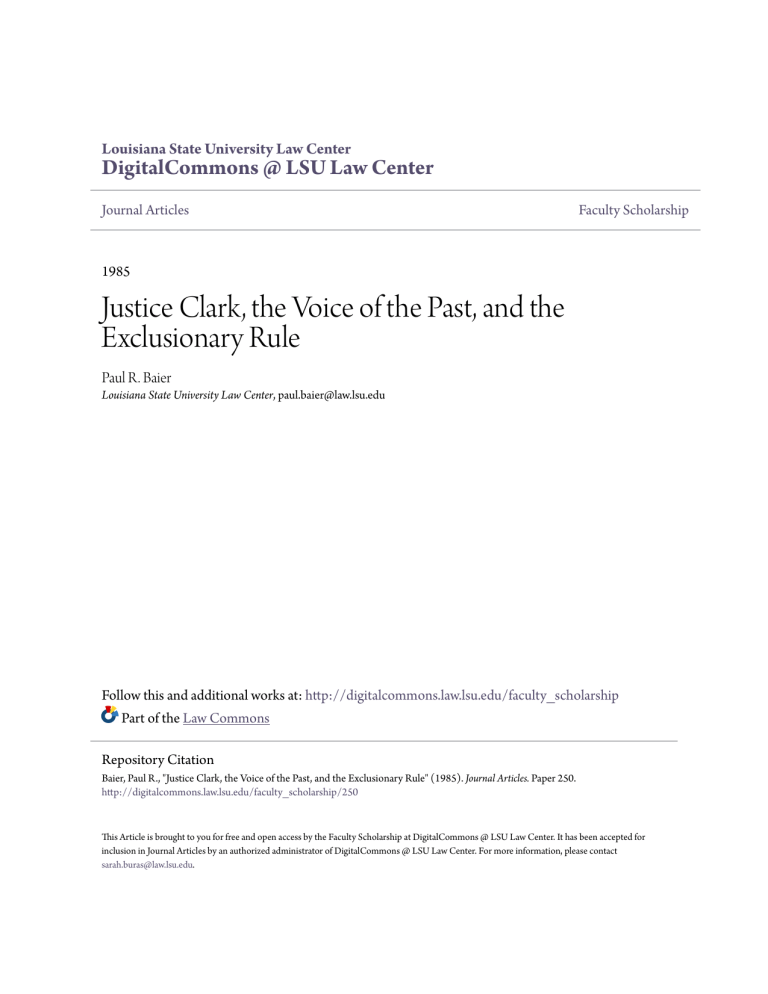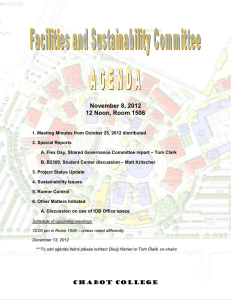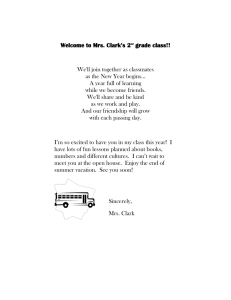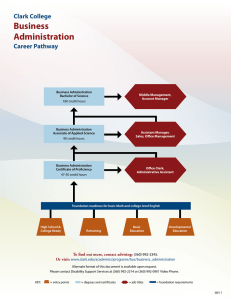Justice Clark, the Voice of the Past, and the Exclusionary Rule

Louisiana State University Law Center
DigitalCommons @ LSU Law Center
Journal Articles
1985
Justice Clark, the Voice of the Past, and the
Exclusionary Rule
Paul R. Baier
Louisiana State University Law Center , paul.baier@law.lsu.edu
Faculty Scholarship
Follow this and additional works at: http://digitalcommons.law.lsu.edu/faculty_scholarship
Part of the Law Commons
Repository Citation
Baier, Paul R., "Justice Clark, the Voice of the Past, and the Exclusionary Rule" (1985).
Journal Articles.
Paper 250.
http://digitalcommons.law.lsu.edu/faculty_scholarship/250
This Article is brought to you for free and open access by the Faculty Scholarship at DigitalCommons @ LSU Law Center. It has been accepted for inclusion in Journal Articles by an authorized administrator of DigitalCommons @ LSU Law Center. For more information, please contact sarah.buras@law.lsu.edu
.
Justice Clark, the Voice of the Past, and the
Exclusionary Rule
Paul R. Baier*
Having once recognized that the right to privacy embodied in the
F_
ourth Amendment is enforceable against the States, and that the
�1ght to be secure against rude invasions of privacy by state officers
1�, therefore, �onstitutional in origin, we can no longer permit that nght to remam an empty promise.
-Justice Tom Clark, Mapp v. Ohio.**
The voice of the past, we are told, matters to the present. "History can help people see how they stand, and where they should go."'
Shortly before he died, Justice Tom Clark met with my Supreme
Court seminar students in the East Conference Room of the Supreme
Court. We were a small seminar-the Justice and a busload of young people, with their teacher, on a field trip to the Court. When asked what was the most difficult thing about being on the Supreme Court, Justice
Clark told us, "Well, I suppose all the hullabaloo they make over you.
"2
The conversation turned to
Mapp
v.
Ohio,
to the exclusionary rule,
*
Professor of Law, Paul M. Hebert Law Center, Louisiana State University; Judicial Fellow,
United States Supreme Court, 1975-76. I should like to thank Yale Kamisar for suggesting that I make Justice Clark's comments on Mapp v. Ohio widely available to the community of constitutional scholars.
**
367 U. S. 643, 6 60 (19 6 1), overruling Wolf v. Colorado, 338 U. S. 25 (1949). Justice Clark advanced the thoughts of earlier Justices, including Justice Joseph Bradley, in Boyd v. United States,
116 U.S. 616, 635 (1886): "[C]onstitutional provisions for the security of person and property should be liberally construed. A close and literal construction deprives them of half their efficacy, and leads to gradual depreciation of the right, as if it consisted more in sound than in substance."
Similarly, Justice Holmes had written in Silverthorne Lumber Co. v. United States, 251 U.S.
385, 391-92 (1920):
The proposition could not be presented more nakedly. It is that although of course its seizure was an outrage which the Government now regrets, it may study the papers before it returns them, copy them, and then may use the knowledge that it has gained . . . . In our opinion such is not the law. It reduces the Fourth Amendment to a form of words.
And Chief Justice Hughes, in Near v. Minnesota, 283 U. S. 697, 722 (1931), wrote that if prior restraint of publication were permitted, "the constitutional protection [ofliberty of the press] would be reduced to a mere form of words."
I. P. THOMPSON, THE VOICE OF THE PAST, ORAL H I S T O RY 225-26 (1978):
[T]he real justification of history is not in giving an
!
mmortality to a f �w of the old. It is part of the way in which the living understand their place and part m the world . . -, .
[H]istory can help people to see how they stand, and w
� ere they sh?uld go. . . . And m giving a past, it also helps them towards a future of their own makmg.
2.
.
States, in Washington, D.C. (May 3, 1977) (recorded with the permission �f Justice
C: lark)
� hereinaf ter cited as Interview]. All quotations in text are from the sound recordmg of the mterv1ew.
415
Texas Law Review
Vol. 64:415, 1985 and to the role of judicial heroes in giving shape to our law. "I don't know about Mapp being my most important opinion, the one I'm most proud of. I am proud of it, because the idea of Mapp just shocked me."3
Justice Clark explained why:
When I was a kid I came out of the University of Texas Law
School.[4] I went back to Dallas and tried to practice a little law and picked up a few cases and one of them was our cook's. We had a cook-believe it or not-for seven dollars a week. We paid her a dollar a day. That was the going wage for cooks. Her son was a nice little fellow but got into trouble. They found a half-pint of corn whiskey, during prohibition, in his house he had on Elm
Street. And they cut open the mattress; they didn't have a search warrant or anything; they just took a knife and cut the mattresses open, took crow bars and pulled the baseboards away from the wall-just a terrible thing for these police officers to do. Then they carried the half-a-pint on a "silver platter," as they called it, over to the federal court, not to the state court, or the city court, but to the federal court.
And so I filed a motion to quash. And Judge Atwell,[5] who was the judge, said, "Aren't you familiar with such-and-such case?" And I said "No." He said, "Well, that's one of my cases.
Mr. Clerk, take Mr. Clark back there in my chambers and show him Atwell No. 7." I found out he had bound his opinions in
Atwell 1, Atwell 2, Atwell 3 [laughing]-just like the U.S.
Supreme Court does. And there was an opinion that said the fed eral courts would receive the proceeds of an illegal search which was made by state officers or city officers, because the federals had no control over those officers, and it would be an untoward thing for a person to go free just because of some technicality.[6] [Thus,]
3. Justice C lark's reaction was not initially shared by all members of the Court. As Justice
Potter Stewart has written:
S�ewart, The Road to Mapp v. si?nary did not JOtn the
�
_I was shocke? when Justice Clark's proposed Court opinion reached my desk.
I i m overrul mg an important doctrme m a case in which the issue was not briefed, argued, or by the state courts, by the parties' counsel, or at our conference following discussed the oral argument. t ass c!'
�le Ill
Mapp
L.B., 1922; d
976).
?
hio and Beyond: The Origins, Development and Future of the Exclu
Search-and-Seizure Cases, 83 COLUM. L. REV. 1365, 1368 (1983). opinion because of its activist approach in deciding an issue
�
Justice Stewart not before the
C?urt. Ye�r.s la!er, _however, he acknowledged that it is "perhaps the most important seizure dec1s10n m history , 1
"
'd
· • sary to keep the nght of pr' . promise.
D
S
11
4·
�
Id. at 1389 es upreme ourt
ERAL J
5.
U
D d
" d b
(emphasis in original).
· · · admitted to Texas and Texas Supreme Court bars unty, TCexas, 1927-32; Attorney General, United States
I
CIARY 50
1949 67 e
William Hawley At died December
6
·
See
22 196 1
II U ·
' our mo_nths before
' e.g., In re Guzzard1, 84 une d s
13 197
'
1922·
1945-49·' Asso
·
· · search-and· rule
· neces· an emp t
Y
District Attorney, iate Justice, United
7. BIOGRAPHICAL DICTIONARY OF THE
CJ.)
FED
•
· · 1924-61. Judge Atwe
II
Mapp v. Ohio was decided.
F. Supp. 294, 295 (N.D. Tex. 1949) (Atwell, ("Any
416
Justice Tom C. Clark th� Silver Pl':ltter Doctrine-the idea being that the waiter carries thmgs on a �ilver platte.r from the kitchen to the dining room, and so you earned this whiskey on a "silver platter" from the police department over to the federal court. Potter Stewart knocked that
Young lawyer Clark's experience with blatant violations such as this makes Justice Clark's later concern with strong fourth amendment pro tection easy to understand.
It has been said by one who knew him well that Tom Clark "be lieved in personal growth. There was a determination to grow."9 On the elevator at the Court, after discussing the Mapp case at conference, Tom
Clark turned to Hugo Black and William Brennan and asked,
"[W]ouldn't this be a good case to apply the exclusionary rule and · do what Wolf didn't do?" 10
The answer, of course, was in the affirmative. Justice Clark's landmark opinion in Mapp v.
Ohio infused the fourth amendment with the powerful remedy of the exclusionary rule and extended the Weeks rule11 to the states. Justice Clark's personal papers, including the Mapp files,
12 shed new light on the judicial evolution culminating in Mapp v.
Ohio. They show him to be a keen student of the fourth amendment.
Detailed memoranda, written in longhand, reflect Tom Clark's determi nation to reach an informed decision, in large part through his own re search. Seventeen pages of handwritten notes13 evidence his difficult judicial task: first to understand, then to judge "the competing interests of the social need that crime be repressed ... against the ignoble example of police lawlessly invading the security of the privacy of the people, in utter defiance of a constitutional mandate 'second to none in the Bill of evidence secured through unlawful search and seizure by state officers not acting directly, or indi· rectly, in behalf of the United States is admissible in a prosecution in the national courts."); accord
W. ATWELL, ATWELL'S FEDERAL CRIMINAL LAW AND PROCEDURE WITH PRACTICE HELPS 30
(5th ed. 1943) ("The Federal Government could use evidence secured by state officers on invalid search if the Federal officers had no part in the search.").
7. Elkins v. United States, 364 U.S. 206 (1960).
8. Interview, supra note 2 (footnotes supplied).
9. R. Clark, Remarks at the Opening of the Tom C. Clark Papers, University of Texas School of Law (March 19, 1985).
10. B. SCHWARTZ, SUPER CHIEF 393 (1983).
11. Weeks v. United States, 232 U.S. 383 (1914) (applying exclusionary rule to federal courts and officers).
�
12. The Tom C. Clark Papers were opened to the public on March 19, 19
Tarlton Law Library at the University of Texas School of Law [hereinafter c1_ted as
13.
Archives,
supra note 12, Mapp case file, Box A l 15, _Folder No. first handwritten draft of the opening pages of the trace the origin and development of the exclusionary rule _in Suprem�
�
7. ourt
�
his folder contains the
Mapp op1mon and two detailed_ memoranda which ec1s1ons. These _n_otes reveal the working techniques of Tom Clark and are a window to hts mqumng mmd and spmt.
417
Texas Law Review
Vol. 64:415, 1985
Rights.' "14
In these hand-penned notes, Justice Clark asks himself a question, as though back in law school: "If S(upreme] C[ourt] in 1st establishing ex clusion rule was correct in saying 'the protection of the 4th Amend. is of no value and might as well be stricken from the constitution['] are we not forced to conclude that except to some the Amend[ment] is of little prac tical use[?]"l5 Logic compelled Clark to decide Mapp otherwise. Indeed, common sense was Tom Clark's hallmark; as he wrote, "There is no war between the Constitution and common sense."16 The guarantees of the fourth amendment clearly required corresponding procedural protection and judicial redress. Common sense dictated that "unless the require ments in this field are merely precatory,"17-and they certainly were not-the available "empty remedies"18 were intolerable. Thus Justice
Clark blended research and logical reflection to craft the majority opin ion in Mapp v.
Ohio
fourth amendment. and to effect a vindication of the promise of the
As majestic a decision as Mapp once might have been, the judicial evolution of which it is a part has n ot ceased. Only last term, six Justices
14. The quotation is from the first handwritten draft of the Mapp opinion. Id., Draft of Opin ion, at 4 (handwritten draft), citing Harris v. United States, 331 U.S. 145, 157 (1947).
15. Archives, supra note 12, Mapp case file, Box Al15, Folder No. 7, Draft of Opinion, at 4
(handwritten draft).
16. Mapp, 367 U.S. at 657.
17. Archives, supra note 1 2 , Mapp case file, Box Al 15, Folder No. 7, Draft of Opinion, at S
(handwritten draft).
18. The expression "empty remedies" twice appears in the first draft of the Mapp opinion. The term refers to Justice Clark's appraisal of "the other means of protection one is afforded by legal actions when his privacy is unlawfully invaded," listing these as "trespass, damages, protest to offi cials, resisting force with force, prosecution in some states, etc." At first, Justice Clark summarily dismissed these actions, w riting of them: "Admittedly, however, these are but empty remedies." He crossed out this sentence and substituted: "Our experience, however, shows these to be empty reme dies." Justice Clark then added, "Moreover, they stand in marked contrast to those afforded in the protection of other rights 'basic to a free society' [Wolf v . Colorado, 338 U. S. at 27] such as coerced confessions, free speech and press and religious liberty. It would hardly be fair to so discriminate in the protection of constitutional rights." Archives, supra note 12, Mapp case file, Box Al 15. In con trast, the final version reads:
[T]he admission of the new constitutional right by Wolf could not consistently tolerate de�ial of its most important constitutional privilege, namely, the exclusion of the evidence which an accused had been forced to give by reason of the unlawful seizure. To hold otherwise is to grant the right but in reality to withhold its privilege and enjoyment. .. .
Indeed, we are aware of no restraint, similar to that rejected today, conditioning the enforcement of any other basic constitutional right. The right to privacy, no less important than any other right carefully and particularly reserved to the people, would stand in marked contrast to all other rights declared as "basic to a free society." Wolf v. Colorado,
[338 U.S:l at 27. This Court has not hesitated to enforce as strictly against the States as it does a�amst the Fe�eral G�ver�ment the.rights ?f free speech and of a free press, the rights to notice and to a fa1r,.pubhc tnal, mcludmg, as 1t does, the right not to rehab1hty. be convicted by use
Mapp, 367 U.S. at 656.
418
Justice Tom C. Clark voted to carve a "good faith" exception out of Mapp v.
Ohio.19 I should have preferred to see the Supreme Court enforcing the Bill of Rights.
Justice Brennan, in his dissent in Leon, speaks of "the teaching of those Justices who first formulated the exclusionary rule."20 Again my mind drifts back to what Tom Clark told my students. I treasure the voice of that humble Texan's teaching:
I couldn't understand why
Wolf
v.
Colorado
said that the fourth amendment applied to the states, but it just didn't seem to go all the way-in fact it was just an empty gesture, sort of like what Chief Justice Hughes used to say: No use to have a Constitu tion-it's pretty, got all sorts of nice fringes around it, but it doesn't mean anything, just a piece of paper-unless you really live by it and enforce it. And so that's true with
Mapp
and the fourth amendment.21
Insight into the background of the exclusionary rule is one of the treasures waiting to be uncovered in the recently opened Tom Clark archives at the University of Texas School of Law. Scholars, judges, and students will find his collection invaluable for understanding the judicial process. Through his archives, Tom Clark's voice speaks to us still of wisdom and common sense in the administration of justice.
19. United States v. Leon, 104 S. Ct. 3405 (1984); Massachusetts v. Sheppard, 104 S. Ct. 3424
(1984). But see Justice Clark's explanation of his Mapp opinion, responding to Justice Harlan's criticism:
There is, of course, as in all controversial cases, ground for disagreement. I have a court and therefore my theory at least has support. . . . [I]f the right to privacy is really so basic as to be constitutional in rank and if it is really to be enforceable against the states (Wolf), then we cannot carve out of the bowels [of] that right the vital part, the stuff that gives it substance, the exclusion of evidence.
Archives, supra note 12, Letter from Tom Clark to John Harlan (May 4, 1961), reprinted in part in B.
SCHWARTZ, supra note 10, at 397.
20. Leon, 104 S. Ct. at 3433 (Brennan, J., dissenting). Justice Brennan concludes his dissent by saying: "There is hope, however, that in time this or some later Court will restore these precious freedoms to their rightful place as a primary protection for our citizens against overreaching official dom." Id. at 3446. Twenty years earlier, when Mapp was first decided, Justice Brennan's initial reaction was buoyant: "Of course you know I think this is just magnificent and wonderful. I have not joined anything since I came with greater pleasure." Archives, supra note 12, Letter from Wil liam Brennan to Tom Clark (May 1, 1961), reprinted in B. ScHWARTZ, supra note 10, at 395.
Justice Stevens' separate dissenting opinion in Leon also echoes earlier teaching:
Nor should we so easily concede the existence of a constitutional violation for which there is no remedy. To do so is to convert a bill of Rights into an unenforced honor code that the police may follow in their discretion. The Constitution requires more; it requires a remedy.
If the Court's new rule is to be followed, the Bill of Rights should be renamed.
Id. at 3456-57 (Stevens, J., dissenting) (footnotes omitted) (emphasis in original).
21. Interview, supra note 2.
419



